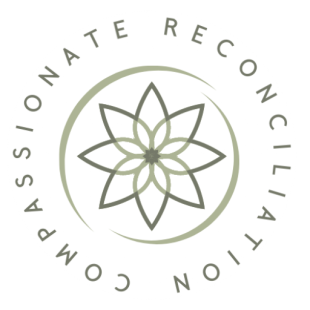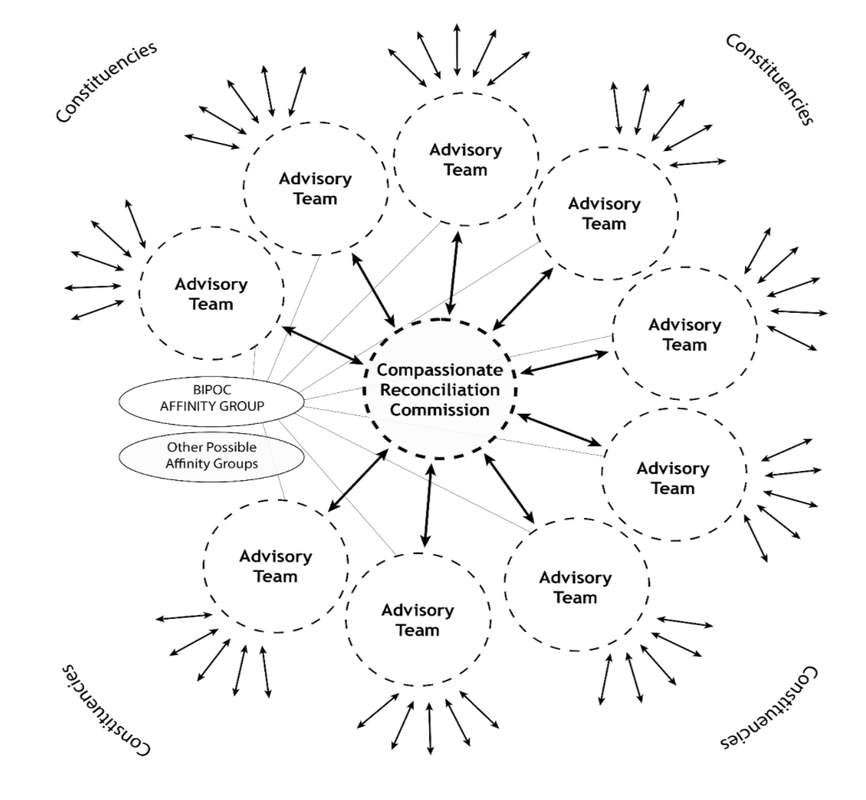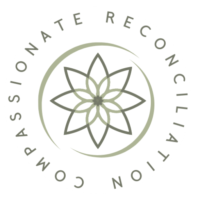Compassionate Reconciliation Commission (CRC)

One of our main tasks has been to assist in the development of a sustained and diverse Compassionate Reconciliation Commission (CRC). This commission will serve to lead the Compassionate Reconciliation Project (CRP). We have worked closely with the ICRC over the last many weeks to help understand the broader composition of the community and its interest groups, and to build a structure for the CRC which can give voice to all aspects of the community. Through this process, we have proposed to create a structure consisting of series of Advisory Teams working alongside the core CRC, as follows:
- Advisory Teams: The Advisory Teams will consist of stakeholder groups representing a wide cross-section of interests in your community. These diverse groups will give feedback to, and receive updates from the core CRC. Each Advisory Team will select one or two representatives to be part of the core CRC.
- CRC: The Core CRC will be designing and coordinating strategies and directions to advance the goals of the Compassionate Reconciliation Project during the current moment and beyond.
- Affinity Groups: The success of the CRC will require the involvement of community members with diverse lived experiences, ages, racial identities, sexual and gender identities, and geographical locations. Affinity groups are spaces where people who share a common identity can provide support to one another as they undertake a process with others. Based on the needs expressed within our engagement so far, a specific Affinity Group will be made available to Advisory Team members who identify as Black, Indigenous, or persons of color. Other Affinity groups can be made available as requested.

Just Outcomes will be providing a thorough orientation to all the Advisory Teams and CRC members, to ensure all involved are equipped with skills, knowledge and understanding to have meaningful and productive dialogue about the work ahead. The immediate focus of the CRC will be:
- addressing the needs for healing and recovery among members of the Next Gen who reported experiencing harm while attending community-run boarding school programs and while growing up in the community; and,
- attending to the divisions that have arisen in the community in the aftermath of reports of harm.
Once the CRC is established in March or April, we will be working closely with the Commission to identify key needs in the community, and help design compassionate reconciliation and restorative justice processes and interventions as required. Guided within a principled approach, these processes will be creative and flexible in their approach to addressing harm and working toward healing.
HISTORY
Our Path to Compassionate Reconciliation
In alignment with our commitment to truth and high ethical standards, formal and immediate steps were taken to address the allegations. A committee was formed called the Collaborative Response Team (CRT) to guide the response by our organizations.
Listening Tour meetings were held throughout our global community to provide a safe environment for members to share their experiences and perspectives, so everyone’s story could be heard. It became clear that a broader process for truth and reconciliation was needed.
We chose an impartial and well trained group of professionals to lead the Compassionate Reconciliation process in order to facilitate healing and inclusion for all those who have reported harm in our community.
After researching work done in the areas of restorative justice and conflict transformation, and vetting 17 teams from around the world, Just Outcomes was selected for this important work with our community.
The effort to find lasting and just solutions will take at least one to two years to complete. We welcome and invite your assistance and participation in creating new beginnings and visioning the future for our global yogic and dharmic communities. While we do not have all the answers yet, we are opening a space for all voices and input to be included in re-envisioning our future together.
PROCESS
Phases of the Compassionate Reconciliation Process

Phase I prioritizes relationships, assessment, and convening and developing the CRC. Just Outcomes is focusing efforts on meeting individuals and groups within our community to better understand the diverse needs and experiences present. This learning and assessment process is helping Just Outcomes gain an understanding of what might be needed to meaningfully address these needs. Through this networking and relationship-building, Just Outcomes is also supporting the convening and development of the CRC. The CRC will engage the many voices that exist in our community using advisory committees and an inclusive communication strategy. Once established, the CRC will support the design and implementation process occurring in Phases II and III.

Phase II will prioritize strategic planning and capacity building for the successful implementation of restorative justice, conflict transformation and change management processes in Phase III. Though some additional assessment may be needed, the core focus for Just Outcomes will be facilitating and supporting the strategic work of the CRC. Just Outcomes will also design and deliver trainings for those in our community that wish to support this collective healing journey. Phase II will begin sometime in the 2nd quarter of 2021.

Phase III will prioritize program implementation, large scale community dialogue and restorative justice processes, and sustainability planning. Phase III will focus on the execution of the plans put in place by the CRC in Phase II.
Our Hopes for the Future
As a community built on a shared vision of service, righteous action and goodwill to all, we have experienced a time of challenge and polarization. We are committed to finding a path forward by working together to find a place of understanding and healing. Through our Compassionate Reconciliation process, we hope to:
- Include all facets of our communities who wish to be involved, recognizing the value of each person and the importance of hearing all voices.
- Develop greater understanding of the harm experienced individually and collectively, and find our way toward healing.
- Support healing through dialogue, intentional listening, supportive services (such as counseling), and reparative action.
- Restore trust within our communities and affirm the value of our way of life.
- Preserve the integrity, history and benefits of our teachings as well as the sustainability of our organizations.
Engaging in Compassionate Reconciliation

